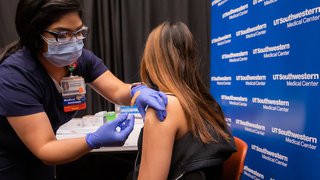Respiratory disorders, or lung diseases, are disorders such as asthma, cystic fibrosis, emphysema, lung cancer, mesothelioma, pulmonary hypertension, and tuberculosis. If left untreated, lung disease can produce health complications, problematic symptoms, and life-threatening conditions.
Lung disease is the third-leading cause of death in the United States, and lung disease and other breathing problems are leading causes of death in infants.
UT Southwestern Medical Center’s program for lung disorders offers some of the most advanced interventional therapies and surgical procedures available to treat all forms of lung disease.
Our clinicians and researchers have made important contributions to improving the lives of patients, as well as developing diagnostic and therapeutic techniques that have advanced the science of lung disease.
Diagnosis
Before a treatment or rehabilitation plan can be established for pulmonary conditions, a physician must first determine the reason for, and source of, a condition. After the evaluative information is collected and reviewed, your physician, often a pulmonologist, will determine the best treatment plan, based on your condition and preferences.
There are various types of diagnostic and surgical tests and procedures used to diagnose and treat pulmonary conditions. At UT Southwestern, we will help you understand your pulmonary diagnostic and surgical procedures, including an overview of the procedure, reasons for the procedure, risks of the procedure, what to do before the procedure, and what to expect during and after the procedure.
Patients also can play a major role in relieving symptoms of lung disease by understanding risk factors and taking actions to minimize their susceptibility to lung disease and its progression.














